Research
Republic of Tajikistan at the UN General Assembly: Highlights of the statements made at the general debates from 1992 till 2020
Authors: D. Ziganshina, A. Galustyan, D. Abasova
Experts from Tajikistan: Prof. Ya. Pulatov, T. Valamat-Zade, K. Khidoyatzoda
Information collection: I. Belikov
Design: A. Degtyaryova
Prepared as part of the UNECE Project “Support to the Network of Russian Speaking Water Management Organizations” financed by the Government of the Russian Federation”
© UNECE, SIC ICWC, authors
In late 2020 - early 2021, on the occasion of the UN 75th anniversary, members of the Expert Platform made a review of speeches of Central Asian countries at general debates of the UN General Assembly over the period from 1992 to 2020. The objective of this study is to identify what issues the countries have addressed from the main world tribune and what initiatives they have pushed forward. A summary of Tajikistan's speeches review is given below.
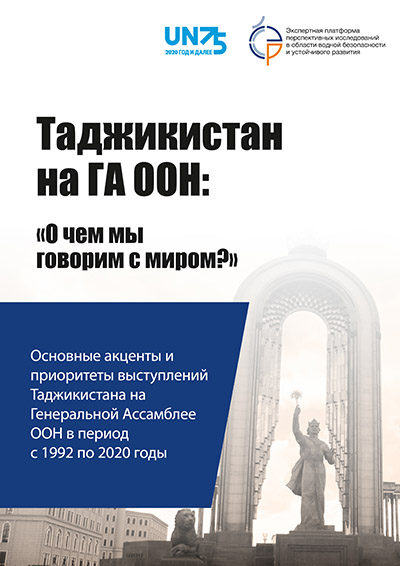
Since independence, Tajikistan has actively advanced its development and international cooperation priorities from the UN rostrum. Tajikistan regularly spoke on the stabilizing and consolidating role of the United Nations and a need for comprehensive and overall reformation of the UN, addressed the issues of terrorism, extremism and drug trafficking. Among the priority issues were political, socio-economic and democratic transformations in the country, stabilization of the inter-Tajik conflict (1992-2000), and resolving the situation in Afghanistan. Sustainable development, green economy, promotion of global water initiatives (since 1999), and enhancement of global partnership and regional cooperation round out the top ten frequently discussed matters.
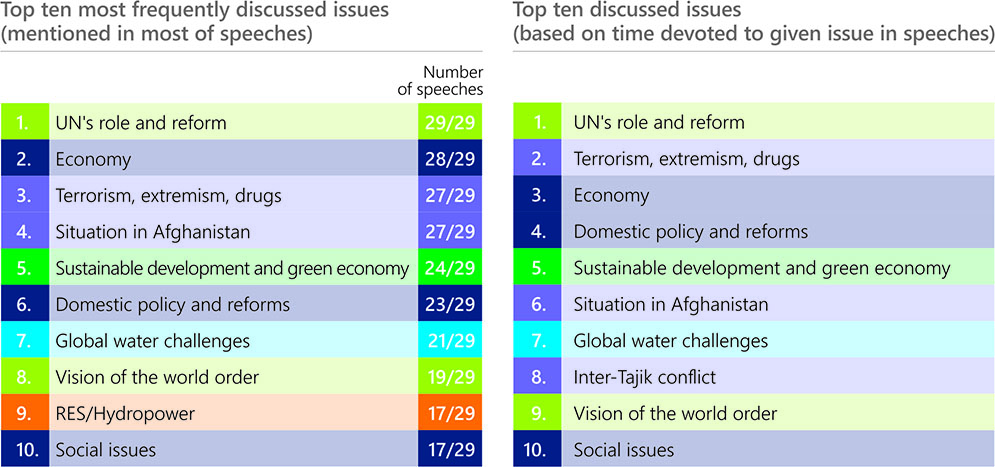
Over the years, Tajikistan put emphasis on such serious environmental problems as the threat of an outflow of highland Lake Sarez, the Aral Sea crisis, access to drinking water, effects of climate change (starting from 63/2008) and degradation of glaciers (starting from 62/2007). Since 2017, it has underlined a need to develop national hydropower, which is beneficial for the country itself and may have a positive effect on sustainable development in other states in the region. The country has regularly drawn attention to natural disasters that hit the country and became more intensive as a result of climate change.
Thematic priorities by decade
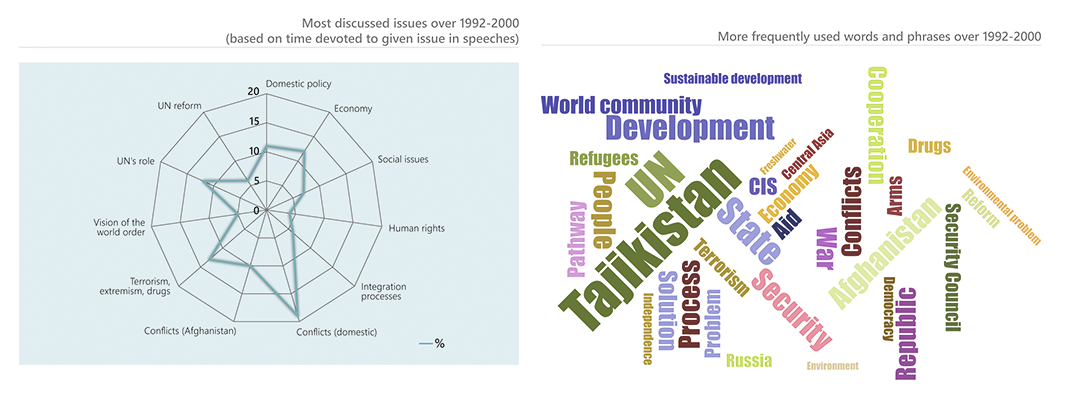
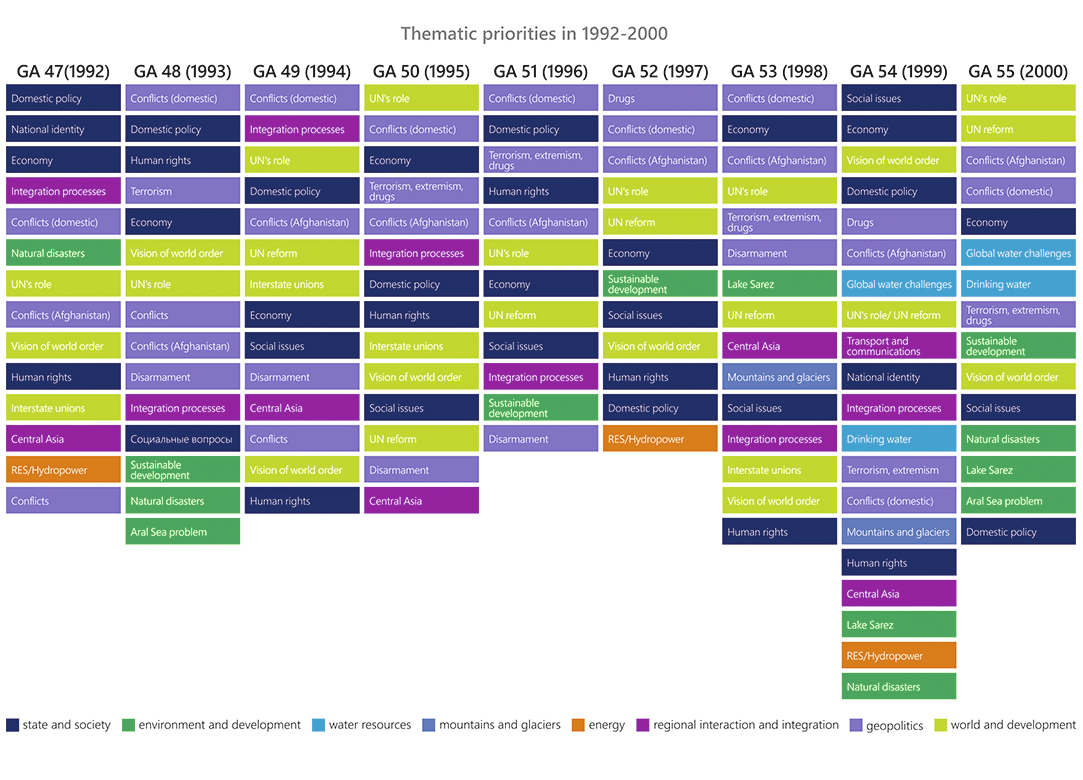
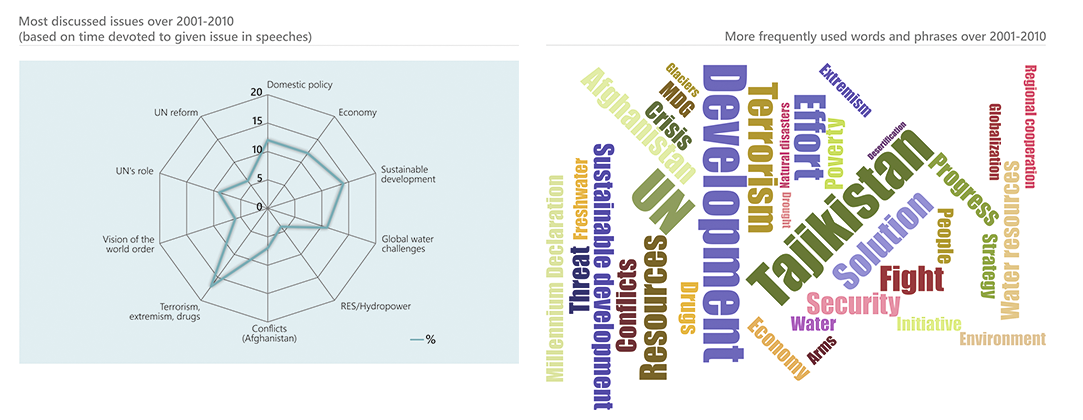
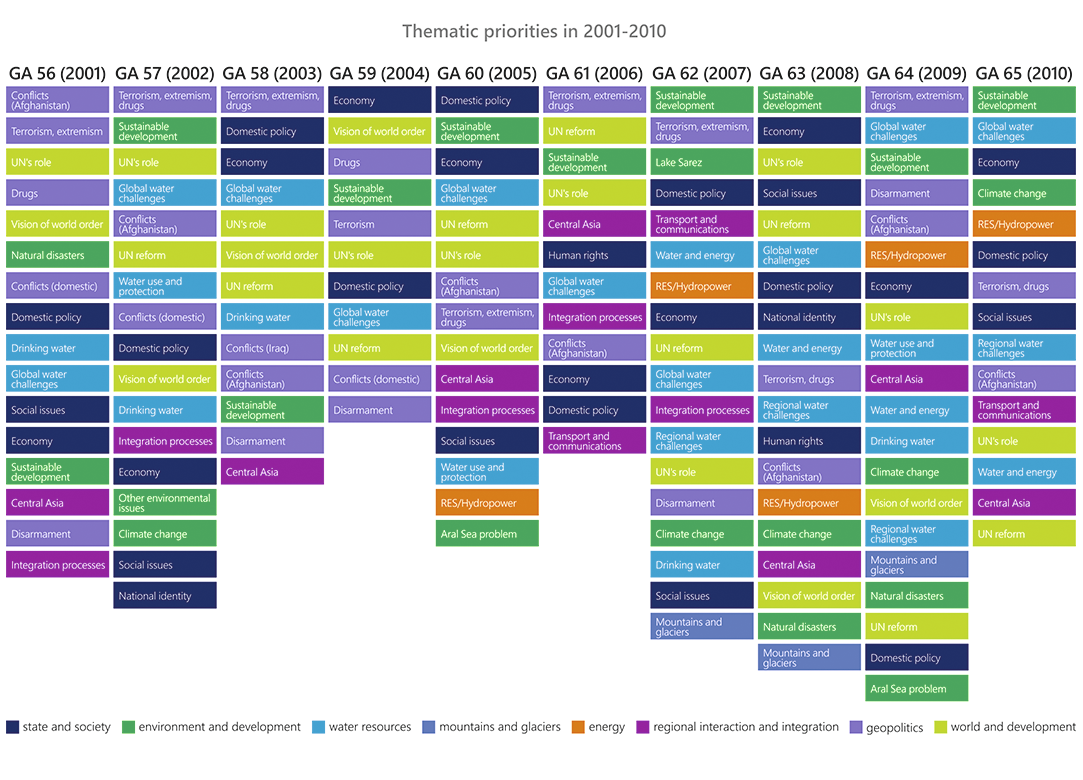
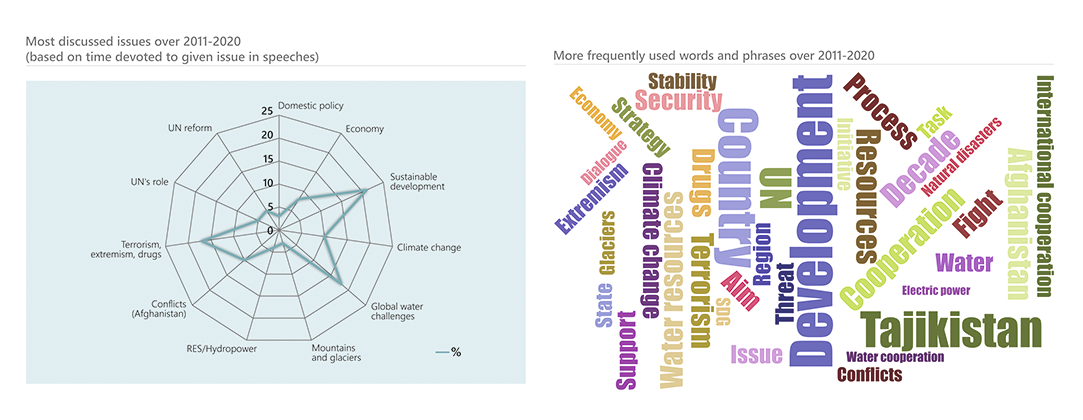
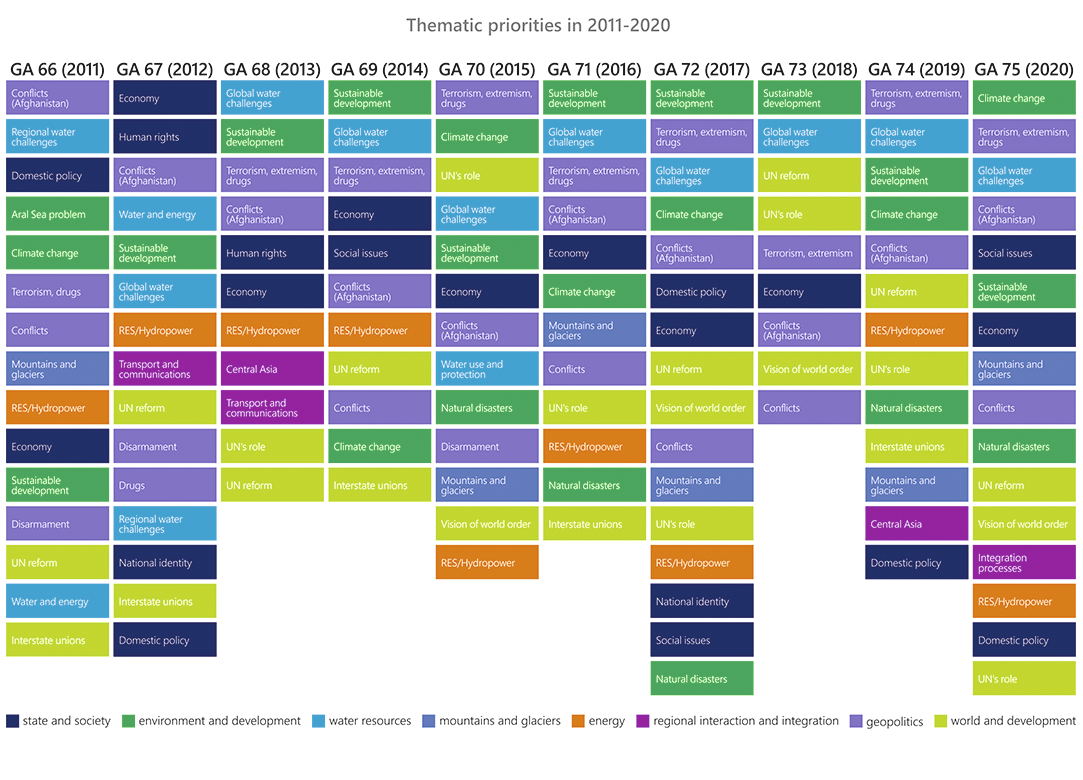
Key initiatives put forward by Tajikistan at UN GA
- Convene a special session of the Security Council to discuss the situation in Tajikistan and the granting to the Collective Peace-keeping Forces of the Commonwealth of Independent State the status of peace-keeping forces under the auspices of the UN (49/1994)
- Convene an international conference on refugees and migrants in the post-Soviet space (joint initiative of CIS states) (50/1995)
- Create a security belt around Afghanistan (A/S-20/PV.2/1998)
- Proclaim 2003 as the International Year of Freshwater (54/1999)
- Develop and implement, by means of common efforts, of a package of measures for regional water use and protection on a global scale (55a/2000)
- Convene in 2003 a special UNGA session on counteracting terrorism (57/2002)
- Proclaim 2005-2015 as the International Decade of Freshwater (58/2003)
- Establish a global partnership for counteracting the narcotics threat (58/2003)
- Establish under the auspices of the UN an international mechanism for coordination of the Aral Sea disaster mitigation efforts (60a/2005)
- Announce 2012 as the International Year of Water Diplomacy (58/2003)
- Conduct a comprehensive assessment of the entire system of water use in Central Asia under the aegis of the United Nations, including the efficient and effective operation of all existing reservoirs and a comprehensive survey of the environmental situation in the region (66/2011)
- Develop a global water vision beyond 2015 (68/2013)
- Declare a new International Water Decade (70/2015)
- Develop a comprehensive regional plan on adaptation to climate change (70/2015)
- Establish a special group to study the problem of northern drug trafficking route (74/2019)
- Hold a conference on the midterm comprehensive review of the implementation of the International Decade for Action “Water for Sustainable Development, 2018-2028” (75/2020)
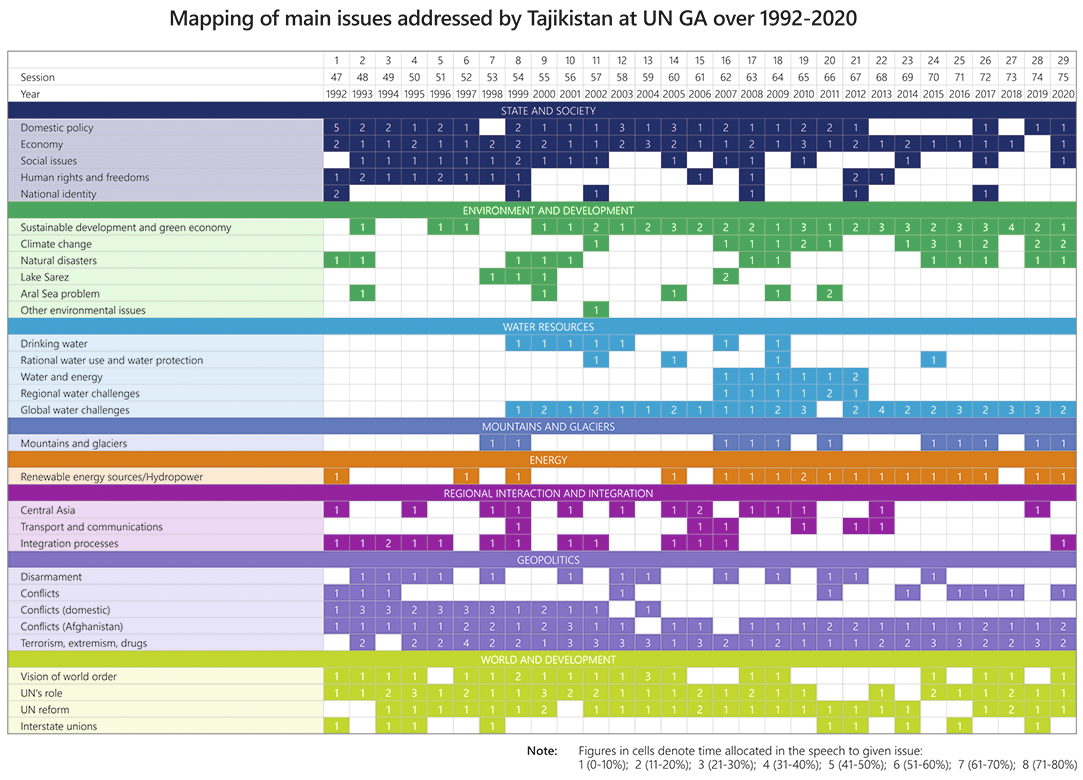
Experts’ views
In experts’ view, among the key successes of the Tajik diplomacy at the UN platform are (1) enormous diplomatic efforts to mobilize support of the world community for building of peace and national unity in Tajikistan and development of national economy; (2) adoption of four Tajikistan-proposed water initiatives (UNGA resolutions 55/196, 58/217, 65/154, 71/222) that confirmed the country’s commitment to sustainable development and rational use of global water resources; (3) initiative on creation of an anti-drug security belt around Afghanistan and combatting of drug trafficking; (4) wider use of preventive diplomacy tools; (5) common initiative of CIS member-states to convene an international conference on refugees and migrants in the post-Soviet space and adoption of a declaration as the outcome of the conference that have prevented the humanitarian catastrophe.
Experts named a number of risks that require increasing attention from Tajikistan and the world community. These include the growing demand for clean drinking water that calls for development of principles of efficient water use under UN’s umbrella; the issue of regional security related to breach of Lake Sarez; joint measures for climate change mitigation. Among the concerns are also increasing ideological and information-psychological war via Internet and mass media; challenges to the establishment of stability in neighboring Afghanistan; growing number of private militias and adoption by the UN Security Council of resolutions that permit military interventions. The situation related to coronavirus outbreak disclosed gaps in the global healthcare system and in the system of international economic relations. In this context, it is necessary to develop rules for servicing public debt by developing countries and a common mechanism for solution of social problems.
In the future statements experts suggest to address: (1) establishment in Tajikistan of an international forum on post-conflict recovery of Afghanistan under the aegis of UN; (2) redirection of resources and human potential to ensure human life in harmony with nature; (3) building cooperation on water, hydropower, food and environment; (4) implementation of joint regional initiatives to save the Aral Sea; (5) utilization of tailings ponds; (6) addressing problems of access to high technology and integration into the world economic system; (7) gaining of access for CA citizens to education in leading world universities in online regime and on preferential terms.
 Ya. Pulatov:
Ya. Pulatov:
“The following matters can be recommended for the future statements of Tajikistan at UNGA:
• Joint conservation of water fund, especially glaciers;
• Development of cooperation on water, hydropower, food and environment;
• Water conservation and agricultural intensification;
• Development of regional integration”.
 T. Valamat-Zade:
T. Valamat-Zade:
“Since the new independent state was formed and established under conditions of the bloodiest civil war in the post-Soviet space that virtually devastated country’s economy and divided its population into hostile groups, the positive outcomes of diplomatic efforts are easy to see. These are building of peace, return of State authority and the rule of law, national unity, and development of economic foundations”.
 K. Khidoyatzoda:
K. Khidoyatzoda:
“It is generally recognized that Tajikistan is a world leader in promoting solution of water problems. Along with this, another key idea of President Emomali Rahmon should be noted. This is the creation of a security belt around Afghanistan and counteracting of drug trafficking”.


